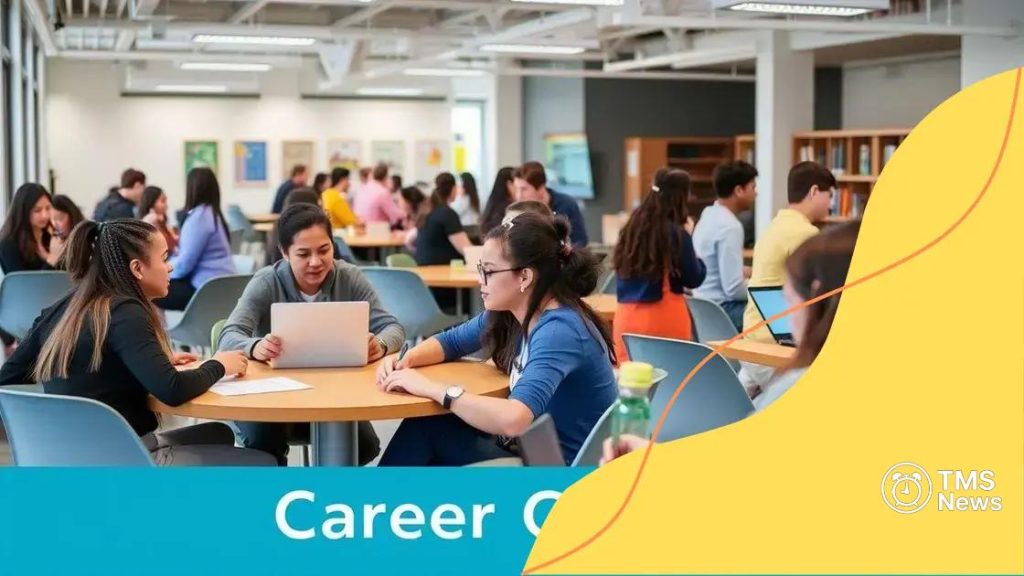Gen Z career centers undergo modernization for success

Anúncios
Modernizing career centers involves integrating technology, collaborating with local businesses, and tailoring services to meet the unique needs of Gen Z, ultimately enhancing career readiness and student engagement.
Gen Z career centers undergo modernization to better align with the unique challenges and aspirations of today’s youth. Have you noticed how these centers are evolving to support new career paths and skills? Let’s dive into the transformative changes shaping their future.
Anúncios
Understanding the needs of Gen Z
Understanding the needs of Gen Z is essential for modern career centers. This generation has unique aspirations and challenges that differ from previous cohorts. For instance, they’re looking for job opportunities that not only provide income but also align with their values and interests.
Key Characteristics of Gen Z
One major characteristic of Gen Z is their comfort with technology. They have grown up in a digital world, making them more adept at using online tools for learning and career development. This proficiency encourages career centers to adopt new technologies that resonate with them.
- Tech-savvy and digitally connected
- Value authenticity and transparency
- Prioritize mental health and work-life balance
- Seek diverse and inclusive workplaces
Additionally, they want guidance tailored specifically to their goals. Career centers must provide personalized services that reflect this need. Mentorship programs, workshops, and networking events can cater to their desire for practical experience and insight.
Anúncios
Importance of Mental Health Support
Gen Z is also very open about discussing mental health. They often seek environments that support wellness in the workplace. Career centers are recognizing this by incorporating mental health resources and workshops into their programs. This approach creates a balanced atmosphere that nurtures both professional and personal growth.
By understanding the needs of Gen Z, career centers can better prepare them for their future careers. This involves not only providing information about job possibilities but also fostering environments that support their values and overall well-being.
Innovative programs in career centers
Innovative programs in career centers are crucial for connecting with the needs of today’s youth. These programs are designed to help Gen Z navigate their career paths while also fostering personal growth. By integrating modern approaches, career centers can better serve this generation.
Latest Trends in Career Programs
One trend is the use of virtual reality (VR) and augmented reality (AR) for career exploration. These technologies allow students to experience different work environments without leaving the center. They can interact with simulations that give them insights into various careers.
- Virtual internships for hands-on experience
- Workshops on digital skills and resume building
- Collaboration with local businesses for real-world exposure
- Networking events with industry professionals
Additionally, many centers are focusing on wellness programs. These initiatives provide resources for mental health support and career readiness, recognizing the importance of a balanced approach to career preparation.
Mentorship and Guidance
Another innovative program is the mentorship model, which pairs students with industry professionals. This setup not only boosts confidence but also helps students gain valuable insights into their fields of interest.
Furthermore, tailored workshops are becoming more common. These workshops address specific skills that Gen Z needs to thrive. Topics can range from personal branding to emotional intelligence, which are essential in today’s job market.
Employing such innovative programs in career centers enables them to create supportive environments where Gen Z can flourish. The combination of practical experience, mentorship, and skill development prepares students for the challenges ahead.
Technology integration in counseling

Technology integration in counseling is key to modernizing career centers. By utilizing digital tools, centers can enhance the quality of guidance they provide. This shift allows counselors to reach more students and offer tailored resources effectively.
Benefits of Technology in Counseling
One of the most significant benefits is the ability to connect with students in real-time. Many centers now use online platforms for virtual meetings. This accessibility means that students can receive help from wherever they are, making counseling more flexible.
- Real-time communication through chat and video calls
- Online assessments for personalized career advice
- Access to a wealth of resources and tools
- Enhanced tracking of student progress
Additionally, technology can aid in data collection. By analyzing student interactions, counselors can understand trends and improve their approaches. This leads to more effective strategies tailored to the needs of Gen Z and their career goals.
Innovative Counseling Tools
Innovative tools like career assessment apps are gaining popularity as well. These apps provide students with personalized insights based on their skills and interests. Students can identify potential career paths that align with their passions and strengths.
Furthermore, virtual reality (VR) is being embraced for immersive career exploration. This technology lets students experience various job environments in a realistic way, which can spark interest and excitement. For example, they can virtually step into a day in the life of a designer or a technician.
Overall, the integration of technology in counseling not only makes the process more engaging but also empowers students. As career centers adapt to incorporate these tools, they ensure that young people receive the most relevant support in their career journeys.
Collaborations with local businesses
Collaborations with local businesses are becoming essential for modern career centers. These partnerships serve to bridge the gap between education and employment. By working together, career centers and businesses can provide valuable resources and opportunities for students.
Why Collaborate?
Local businesses bring real-world experience to the table. They can offer internships, job shadowing, and mentorship programs that enhance student learning. These experiences allow students to apply classroom knowledge in practical settings, making them more marketable when they enter the workforce.
- Access to internships and job placements
- Real-world insights from industry professionals
- Networking opportunities for students
- Workshops tailored to skill development
Additionally, partnerships can foster innovation within career centers. Businesses may provide funding for new programs or technology that benefits students. This support helps centers stay current with industry trends and needs.
Examples of Successful Collaborations
Many successful collaborations exist between career centers and local businesses. For instance, a tech company may partner with a career center to run coding bootcamps for students. These bootcamps not only teach valuable skills but also connect students with potential employers.
Similarly, a local hospital might offer healthcare career exploration days. During these events, students learn about various healthcare careers while interacting with professionals in the field. This exposure can spark interest in health-related pathways.
By forming collaborations with local businesses, career centers ensure that students receive relevant training and support. As the job market continues to evolve, these partnerships will play a crucial role in preparing the next generation for success.
Assessing the impact of modernization
Assessing the impact of modernization in career centers is crucial to ensure they meet the needs of today’s students. With ongoing changes, it’s important to evaluate how these updates benefit both the centers and the individuals they serve.
Measuring Success
One way to assess the impact is through student feedback. Gathering opinions from students about new programs and technologies helps centers understand what is working and what needs improvement. Surveys can also provide insights into student satisfaction and career readiness.
- Increased student engagement levels
- Improvement in job placement rates
- Feedback regarding the effectiveness of new technologies
- Success stories from alumni
Additionally, monitoring key performance indicators (KPIs) can reveal how modernization affects outcomes. Centers can track metrics such as attendance rates in workshops and participation in mentorship programs. This data helps identify trends and patterns that highlight areas of growth.
The Role of Technology in Assessment
Technology plays a vital role in assessing impact. Analytics tools can help career centers evaluate how well they are serving their students. For example, using software to track student progress over time can show whether new initiatives are making a difference.
Moreover, partnerships with local businesses create opportunities for feedback as well. Companies that hire students can share their observations about the readiness of graduates, providing valuable information about the effectiveness of training and preparation.
Through comprehensive assessment strategies, career centers can continuously adapt and improve. By focusing on feedback and data analysis, they ensure that modernization efforts truly benefit the fresh workforce entering the job market.
FAQ – Frequently Asked Questions about Modernizing Career Centers
What is the main goal of modernizing career centers?
The main goal is to better meet the needs of today’s youth by providing relevant resources, technology, and support for career readiness.
How can technology improve counseling services?
Technology enhances counseling services by allowing real-time communication, personalized assessments, and access to a broader range of resources.
Why are collaborations with local businesses important?
Collaborations with local businesses create internship and job opportunities, providing students with real-world experiences and insights into various industries.
How can centers assess the impact of their modernization efforts?
Centers can assess their impact by collecting student feedback, tracking key performance indicators, and analyzing data to improve programs continuously.





